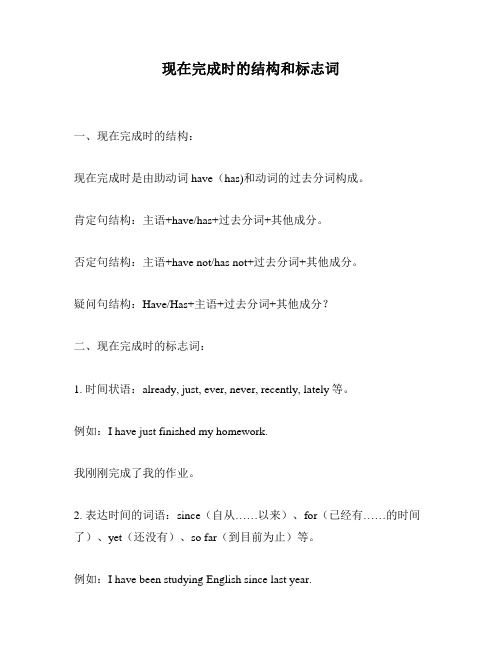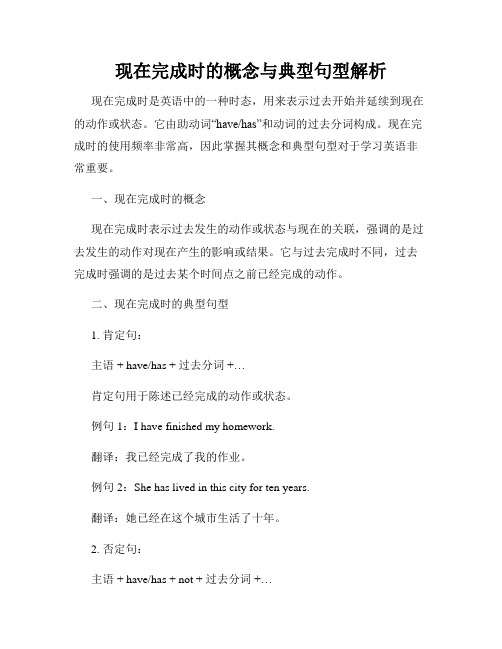小学英语-现在完成时
现在完成时的基本用法

现在完成时的基本用法
英语现在完成时是表示动作或状态已经完成或发生在过去,但与现在有关的一种时态。
它由助动词"have/has"加上过去分词构成。
基本用法如下:
1. 表示过去发生的动作对现在造成的影响或结果。
例句:I have finished my homework.(我已经完成了我的作业。
)
She has lived in London for five years.(她已经在伦敦生活了五年。
)
2. 表示过去开始并一直延续到现在的动作或状态。
例句:He has worked in this company since 2010.(他从2010年就在这家公司工作。
)
We have known each other for a long time.(我们认识彼此已经很长时间了。
)
3. 表示过去的动作或经历与现在的情况或经历形成对比。
例句:I have traveled to many countries, but I have never been to Japan.(我去过许多国家,但从未去过日本。
) They have already eaten dinner, but we haven't.(他们已经吃过晚饭了,但我们还没有。
)
需要注意的是,现在完成时强调的是过去的动作或状态与现在的关系,所以常常与现在的时间状语连用,如"already"(已经)、"just"(刚刚)、"recently"(最近)、"since"(自从)等。
英语完成时归纳总结大全

英语完成时归纳总结大全英语完成时是英语语法中比较复杂的一个时态,它包括了现在完成时、过去完成时和将来完成时。
本文将为您归纳总结一下英语完成时的用法和特点。
一、现在完成时(Present Perfect)现在完成时由助动词“have/has”与动词的过去分词构成,表示过去发生的动作对现在产生的影响或结果。
1. 表示过去经历的经验或动作对当前所处的状态或情况产生影响。
例:I have lived in this city for five years.(我在这个城市住了五年了。
)He has learned a lot from his mistakes.(他从他的错误中学到了很多。
)2. 表示过去已完成、但对现在还有影响或结果的动作。
例:I have finished my homework.(我已经完成作业了。
)They have left for the airport.(他们已经去机场了。
)3. 表示过去已经发生的动作在现在还有可能继续或重复。
例:She has read that book three times.(她已经读了那本书三遍了。
) Have you ever visited London?(你曾经参观过伦敦吗?)二、过去完成时(Past Perfect)过去完成时由助动词“had”与动词的过去分词构成,用于表示在过去某一时间或动作之前已经完成的动作。
1. 表示在过去某一时间或动作之前已经完成的动作。
例:I had already eaten when she arrived.(她到达时我已经吃过了。
) They had finished their work before the meeting started.(开会前他们已经完成了工作。
)2. 过去完成时常与“before”、“after”等表示时间先后关系的词连用。
例:He had left before I arrived.(我到达之前他已经离开了。
现在完成时的结构和标志词

现在完成时的结构和标志词一、现在完成时的结构:现在完成时是由助动词have(has)和动词的过去分词构成。
肯定句结构:主语+have/has+过去分词+其他成分。
否定句结构:主语+have not/has not+过去分词+其他成分。
疑问句结构:Have/Has+主语+过去分词+其他成分?二、现在完成时的标志词:1. 时间状语:already, just, ever, never, recently, lately等。
例如:I have just finished my homework.我刚刚完成了我的作业。
2. 表达时间的词语:since(自从……以来)、for(已经有……的时间了)、yet(还没有)、so far(到目前为止)等。
例如:I have been studying English since last year.我从去年开始学习英语。
He has lived in this city for three years.他在这个城市已经住了三年。
3. 直接用于现在完成时,如:never、ever、before等。
例如:Have you ever been to France?你去过法国吗?I have never seen such a beautiful flower before.我从未见过如此美丽的花。
三、现在完成时的用法:1. 表示一个已经完成的动作或状态,强调过去的经历对现在的影响和重要性。
常和时间状语连用。
例如:I have visited Beijing many times.我去过北京很多次。
2. 表示一个从过去开始一直延续到现在的动作或状态,常和since和for连用。
例如:She has been learning Chinese for two years.她学习汉语已经两年了。
3. 表示在过去某个时间点开始,并且一直延续到现在的动作或状态,常与时间状语连用。
小升初英语现在完成时单选题60题

小升初英语现在完成时单选题60题1. I ______ my homework already.A. have finishedB. finishedC. finishD. finishes答案:A。
本题考查现在完成时的用法。
现在完成时的构成是“have/has + 过去分词”,A 选项“have finished”是现在完成时形式,符合题意,表示“已经完成”;B 选项“finished”是一般过去时,强调过去的动作;C 选项“finish”是一般现在时;D 选项“finishes”是一般现在时的第三人称单数形式。
2. They ______ to Beijing twice.A. have goneB. have beenC. wentD. goes答案:B。
“have been to”表示“去过某地( 已回)”,“have gone to”表示“去了某地( 未回)”,本题说“twice”,表示去过两次且已经回来,A 选项“have gone”不符合;C 选项“went”是一般过去时;D 选项“goes”是一般现在时。
所以选B。
3. My sister ______ English for five years.A. has learnedB. learnsC. learnedD. is learning答案:A。
“for five years”是一段时间,现在完成时与一段时间连用,A 选项“has learned”是现在完成时;B 选项“learns”是一般现在时;C 选项“learned”是一般过去时;D 选项“is learning”是现在进行时。
故选A。
4. We ______ never ______ the Great Wall.A. have; visitedB. has; visitedC. haven't; visitedD. hasn't; visited答案:A。
英语知识点:现在完成时(Present Perfect Tense)

英语知识点:现在完成时(Present Perfect Tense)
3. 主谓一致 主语为第三人称单数时,助动词用has;其他情况用have。 六、练习题 1) 填空: a) She __________ (finish) her work already. b) They __________ (not see) this movie yet. c) __________ you ever __________ (be) to New York? d) He __________ just __________ (leave).
英语知识点:现在完成时(PreБайду номын сангаасent Perfect Tense)
3. 表示经历或经验 - 用于描述某人曾经有过的经历或经验。 - 例句:She has traveled to many countries.(她去过很多国家。) 4. 表示刚刚完成的动作 - 通常与just连用,表示刚刚发生或完成的动作。 - 例句:He has just finished his dinner.(他刚吃完晚饭。)
英语知识点:现在完成时(Present Perfect Tense)
五、注意事项 1. 区别一般过去时 一般过去时强调动作发生在具体的过去时间,而现在完成时强调对现在的影响或从过去持 续到现在。 示例: I went to the store yesterday.(一般过去时) vs.I have gone to the store.(现在完 成时) 2. 不可与具体的过去时间状语连用 如yesterday, last week等不能与现在完成时连用,但可以与不具体的时间状语连用,如 ever, never, before等。
英语知识点:现在完成时(Present Perfect Tense)
现在完成时的概念与典型句型解析

现在完成时的概念与典型句型解析现在完成时是英语中的一种时态,用来表示过去开始并延续到现在的动作或状态。
它由助动词“have/has”和动词的过去分词构成。
现在完成时的使用频率非常高,因此掌握其概念和典型句型对于学习英语非常重要。
一、现在完成时的概念现在完成时表示过去发生的动作或状态与现在的关联,强调的是过去发生的动作对现在产生的影响或结果。
它与过去完成时不同,过去完成时强调的是过去某个时间点之前已经完成的动作。
二、现在完成时的典型句型1. 肯定句:主语 + have/has + 过去分词+…肯定句用于陈述已经完成的动作或状态。
例句1:I have finished my homework.翻译:我已经完成了我的作业。
例句2:She has lived in this city for ten years.翻译:她已经在这个城市生活了十年。
2. 否定句:主语 + have/has + not + 过去分词+…否定句用于陈述尚未完成的动作或表达否定的状态。
例句1:I have not seen the movie yet.翻译:我还没有看过这部电影。
例句2:He has not finished his work.翻译:他还没有完成他的工作。
3. 疑问句:Have/Has + 主语 + 过去分词+… + ?疑问句用于询问是否已经完成或发生了某个动作或状态。
例句1:Have you ever been to London?翻译:你去过伦敦吗?例句2:Has she finished her presentation?翻译:她完成了她的演讲吗?4. 现在完成时与时间状语连用:现在完成时经常与时间状语连用,用于强调动作或状态的持续时间。
表示延续时间的时间状语:for + 时间段表示起始时间的时间状语:since + 完整时间点例句1:I have lived in this house for five years.翻译:我已经在这个房子里住了五年了。
英语现在完成时讲解
英语现在完成时讲解英语中的现在完成时(present perfect tense)是用来描述过去发生的动作或情况与现在的关系的一种时态。
它通常用来强调过去发生的事情对现在产生的影响或结果。
在本文中,我们将详细讨论现在完成时的使用情况及其构成方式。
一、现在完成时的构成方式现在完成时的构成方式是由“助动词have/has + 动词的过去分词形式”组成。
具体使用有以下几种情况:1. 肯定句主语 + have/has + 过去分词 + 其他部分例如:- I have studied English for five years.(我已经学习英语五年了。
)- She has travelled to many countries.(她已经去过很多国家了。
)2. 否定句主语 + have/has + not + 过去分词 + 其他部分例如:- He hasn't finished his work yet.(他还没有完成工作。
)- We haven't seen each other for a long time.(我们已经很久没有见面了。
)3. 疑问句Have/Has + 主语 + 过去分词 + 其他部分?例如:- Have you ever visited Paris?(你曾经去过巴黎吗?)- Has she seen the latest movie?(她看过最新的电影吗?)二、现在完成时的使用情况现在完成时通常用于以下几种情况:1. 表示过去开始的动作一直延续至今或刚刚结束的情况。
例如:- I have lived in this city for ten years.(我在这个城市已经住了十年了。
)- They have worked on this project since last month.(他们从上个月开始就一直在做这个项目。
)2. 表示过去发生的动作对现在产生的影响或结果。
现在完成时笔记归纳
现在完成时笔记归纳一、现在完成时的定义。
1. 表示过去发生或已经完成的动作对现在造成的影响或结果。
- 例如:I have lost my key.(我丢了钥匙,结果就是现在我没有钥匙了。
)2. 表示从过去某一时间开始一直持续到现在的动作或状态,可能还会继续下去。
- 例如:He has lived here since 2010.(他从2010年开始就住在这里,并且现在还住在这里。
)二、现在完成时的构成。
1. 肯定句。
- 主语+have/has+过去分词(动词的 -ed形式,不规则动词有特殊变化)。
- 例如:I have finished my homework.(第一人称I,用have,finish的过去分词是finished)- He has gone to Beijing.(第三人称单数he,用has,go的过去分词是gone)2. 否定句。
- 主语+have/has + not+过去分词。
- 例如:I haven't seen that movie yet.(have not可缩写为haven't)- She hasn't come back.(has not可缩写为hasn't)3. 一般疑问句。
- Have/Has+主语+过去分词?- 例如:Have you read this book?(回答:Yes, I have. / No, I haven't.)- Has he eaten lunch?(回答:Yes, he has. / No, he hasn't.)三、现在完成时的标志词。
1. already(已经)- 通常用于肯定句中,位于助动词have/has和过去分词之间。
- 例如:I have already finished my work.2. yet(还,仍然)- 用于否定句和疑问句中,通常位于句末。
- 例如:I haven't seen the movie yet. Have you found your pen yet?3. just(刚刚)- 位于助动词have/has和过去分词之间。
(完整版)小学现在完成时详细讲解与练习
(完整版)小学现在完成时详细讲解与练习什么是现在完成时?现在完成时是英语中的一种时态,用来描述过去发生的动作或事件对现在造成的影响或结果。
在现在完成时中,动词需要用到助动词“have/has”加上过去分词形式。
如何构成现在完成时的肯定句?现在完成时的肯定句构成为:“主语 + have/has + 过去分词 + 其他补充信息”。
例如:- I have finished my homework.(我已经完成了我的作业。
)- He has seen that movie.(他已经看过那部电影。
)如何构成现在完成时的否定句?现在完成时的否定句构成为:“主语 + have/has + not + 过去分词 + 其他补充信息”。
例如:- I have not finished my homework.(我还没有完成我的作业。
)- She has not seen that movie.(她还没有看过那部电影。
)如何构成现在完成时的疑问句?现在完成时的疑问句构成为:“Have/Has + 主语 + 过去分词 +其他补充信息?”例如:- Have you finished your homework?(你完成作业了吗?)- Has she seen that movie?(她看过那部电影吗?)现在完成时的用法现在完成时通常用来表示以下几种情况:1. 过去发生的动作对现在造成的影响或结果。
2. 过去开始的动作直到现在还在持续进行。
3. 刚刚完成的动作或经历。
例如:- I have lost my wallet.(我丢了钱包。
)- They have lived in this city for ten years.(他们在这个城市已经住了十年。
)- She has just arrived at the airport.(她刚刚到达机场。
)现在完成时的练1. 请用现在完成时造句:(例句仅供参考)- 我已经吃过晚饭了。
小学英语-现在完成时
小学英语-现在完成时朗博教育是一所值得信赖的培训学校,他们提供了新概念英语语法串讲,其中包括现在完成时的用法。
现在完成时是指过去发生并已完成的动作对现在造成的影响或后果,或是过去某一时间开始并一直持续到现在并且有可能还会持续的动作或状态。
现在完成时有两种用法。
第一种是表示过去某时发生的动作到目前为止已经完成,例如“I have XXX”和“He has already come”。
第二种是表示动作发生在过去并延续到现在,有可能继续延续下去,例如“I have XXX”和“I have XXX 1990”。
现在完成时的结构包括肯定式、否定式、一般疑问式和特殊疑问式。
肯定式为“主语+ have / has +过去分词”,否定式为“主语+ have / has + not +过去分词”,一般疑问式为“Have / Has +主语+过去分词”,特殊疑问式为“特殊疑问词+have/has+主语+过去分词”。
现在完成时常用的时间状语包括“already。
yet。
ever。
etc”。
例如“We have learned about 3000 English words by the end ofth is term”可以翻译成“到上学期末我们已经学了3000个英语单词”。
需要注意的是,当表示一段时间时,现在完成时可以用for或since引导的状语,例如“I’ve known Li Li for 4 years”和“I have worked here since 8 years ago”。
在肯定陈述句中含有already或just时,在转换成否定句时,要把句中的already或just去掉,在句末加上yet。
RomeXXX in the world。
With its rich history。
stunning architecture。
and us cuisine。
it'XXX.One of the most XXX was built almost 2,000 years ago and was used for gladiatorial contests and public spectacles。
- 1、下载文档前请自行甄别文档内容的完整性,平台不提供额外的编辑、内容补充、找答案等附加服务。
- 2、"仅部分预览"的文档,不可在线预览部分如存在完整性等问题,可反馈申请退款(可完整预览的文档不适用该条件!)。
- 3、如文档侵犯您的权益,请联系客服反馈,我们会尽快为您处理(人工客服工作时间:9:00-18:30)。
现在完成时一、现在完成时的用法1. 过去某时发生的动作到目前为止这个动作已经完成。
如:1)I have finished my homework. 我做完家庭作业了。
(过去某时开始做,到现在已完成)2 )He has already come 他已经来了。
(过去某时开始离开某地到这来,现在已在这。
)2. 表示动作发生在过去并延续到现在,有可能继续延续下去。
如:1)I have studied English for six years. 我已经学了六年英语了。
(六年前开始学英语,一直学到现在, 也可能继续学也可能就此不学了。
)2 )I have lived in Shenyang since 1990. 我从1990 年就在沈阳住。
(从1990 年开始住在沈阳一直住到现在,也可能继续住也可能就此为止。
)二、现在完成时的结构1)肯定式:主语+ have / has + 过去分词2 )否定式: 主语+ have / has + not + 过去分词3)一般疑问式Have / Has + 主语+ 过去分词4 )特殊疑问式特殊疑问词+have/has+ 主语+过去分词三、现在完成时的时间状语现在完成时常用的时间状语包括“already, yet, ever, etc ”。
例如:We have learned about 3000English words by the end of this term.到上学期末我们已经学了3000 个英语单词。
1)当表示一段时间,现在完成时可以用for 或since 引导的状语。
例如:I 've known Li Li for 4 years. 我认识丽丽已经 4 年了。
I have worked here since 8 years ago. 自从8 年前我就在这工作。
2)当在肯定陈述句中含有already 或just 时,在转换成否定句时,要把句中的already 或just去掉,在句末加上yet. 。
例如:I have already seen the film. ------ I haven ' t seen the film yet.He has just come. ----- He hasn't come yet.四、使用时注意事项1. “ have/ has got 形式上是一”种完成时,但和have/ has 为同一意思“有” 例如:Have yougot pen-friends? Yes, I have.你有笔友吗?是的,我有。
Has he got a lot of work to do? No, he hasn 't.他有许多工作要做吗?不,他没有。
2. have/has gone to 、have/has been to 和have/has been in 的区别。
have/ has gone to 去了,在去某地的路上或在某地,人还未回来have/ has been to 曾经去过,人已经回来了have/ has been in 已经在,常与一段时间连用He has been to Shenyang before. 他以前曾去过沈阳。
He has been in Shenyang for ten years. 他在沈阳10年了。
Has he gone to Shenyang? 他去沈阳了吗?3. have/ has been to 常和once, twice, never, ever 连用;have/ has gone to 则不可。
例如:—Has Tom ever been to Paris? 汤姆去过巴黎吗?—Yes, he ' s been there many times. 是的,他去过好几次了。
—Where have they gone? 他们去哪里了?—They've gone to Shenyang. 他们去沈阳了。
4.非延续性动词(或称作终止性动词)不能用“现在完成时+ 表示一段时间的状语”的句型中。
这类动词有:come, go, start, leave, die, buy, finish, join, borrow, stop 等。
但它们能够2 / 6用表示持续状态的相应的延续性动词替换句中的终止性动词arrive, come f be here, be int go to the concert because I ___ my ticket.begin, start f be ondie f be dead get up f be upleave, move f be away ; go out f be outborrow f keep finish/end f be overopen f be open close f be closedjoin — be a member of现在完成时练习:、选择填空1. Kate s never seen Chinese f ,ilm_s_ A. hasn 't she B. has she C. isn 't she D. is she2. -Mum, may I go out and play basketball?- ______ y ou _____ your homework yet?A. Do ;finishB. Are ;finishingC. Did ;finishD. Have ;finished3. His brother has been to Stone Forest twice _____ he came to Yunnan.A. afterB. beforeC. sinceD. for4. Tom______ t he CD player for two weeks.A. has lentB. has borrowedC. has boughtD. has had5. I _____ a letter from him since he left.A. didn 't receiveB. haven 't gotC. didn 't haveD. haven 't heard6. -Have you ever _____ Beijing ? -Yes, I have.A. went toB. gone toC. been inD. been to7. My parents _____ Shandong for ten years.A. have been inB. have been toC. have gone toD. have beenbuy f have 8. I wonA. lostB. don 't loseC. have lostD. is coming9. -Where is Mr Liu? - He ____________ t he library.A. has been toB. has gone toC. has been inD.has went10. We came to Shanghai three years ago, so we _____ here for two years.A. have been toB. have been inC. have beenD. have gone11. - How long ____ you ______ your exam paper? - About three months.A. did ;buyB. have;getC. have;hadD. have;bought12. He tells me he _______ China for over eight years.A. has beenB. has been inC. has been toD. has gone to13. His parents _______ for more than 3 years.A. have come hereB. have started to workC. have lived thereD. have left the university14.I ______ a letter from him since he left .A .didn't receive B.haven't got C.didn't have D.haven't heard 15.—Where have you _______ t hese days ?—I have ______ t o Dalian with my friends .A.been;gone B.been;been C.gone;been D.gone;gone 16.How long have you ______ this book ?A .bought B.borrowed C.had D.lent17.—Where's Peter ?—He _______ to Nanjing .A .is going B.has been C.has gone D.went18.We have lived here ______ f ive years ago .A .when B.since C.before D.after19. —I have watched the game . —Whe n you it ?A . have;watched B. do;watch C. did ;watch D. will ;watch20. Miss Brow n ______ to the Great Wall twice .A . have beenB . has been C. have gone D. has gone二.用动词的适当形式填空1. I __________ a lready ________ (see) the film. I ____________ (see) it last week.2. —___________ he __________ (fini sh) his work yet? —Not yet.3. — __________ you __________ (be) to Hong Kong?—Yes, I ____________ (be) there twice.4. —___________ you ever ____________ (eat ) chocolate? —No, n ever.5. My father ___________ just ___________(come) back from work. He is tired now.6. —Where's Li Min g? —He __________ (go) to the teacher's office.7.I ___________ (work) here since I __________ (move) here in 1999.8. —How long ________ the Wangs ____________ (stay) here ? —For two weeks.三.句型转换(每空一词)1. I have been to Macau before.( 改为否定句)I ____________ bee n to Macau before.2. He hasn't come to school because he's ill.( 就划线部分提问)__________________ he come to school?3. He has learned English for 5 years.( 就戈U线部分提问)__________________________________________ learned En glish?4. I bought a new bike just now.( 用just 改写)I _____ just ___________ a new bike.5. We began to learn English three years ago.( 改为同义句)We __________ __________ English ____________ t hree years.四.填入has / have been 或has / have gone.1. Harry :I saw you in Annabel's Restaurant last night.Diana :No, it wasn't me. I __________ never __________ there.2. Sam:Sally and Tim are on holiday, aren't they? Where _______ they _________ ?Sue :To Florida, again.Sam:How many times _______ t hey ___________ t here?Sue :This is their third visit.3. Steve :Can I speak to Jill, please?Lynn :She's out, I'm afraid. She ___________ to the cinema this evening.Steve :Again? She _______ already _________ to the cinema three times this week.五、用for 或since 填空。
